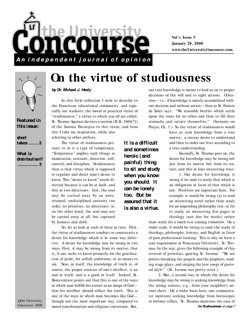The eternally practical liberal arts
by Timothy J. Williams
Mr. Jason Negri’s recent article in the Concourse reminds me of a hallmark of liberal education: it is cherished by the man who is liberally educated and very difficult to recommend to the man who is not.
Mr. Negri seems to believe that those of us who insist on the primacy of forming the mind and character might just be elitists with romanticized notions of the past. In fact, nothing would be more elitist than the idea that the average student is incapable of or uninterested in the life of the mind, desiring only job training from his alma mater. Moreover, if anyone is likely to romanticize the past, it is the man ignorant of history, unable to inhabit the present due to his own cultural poverty, incapable of proposing a better future through lack of philosophical discipline.
No one denies that certain occupations require specific professional competencies. In my experience, though, most employers are perfectly willing to train a new employee, but are impatient with people left ineducable by years of perfunctory vocational studies. I myself have an undergraduate music degree, and graduate degrees in music and French, and have never taken a course in business or computers. Nevertheless, I have not had the least difficulty obtaining employment with commercial interests and have held a couple of positions that promised much better reimbursement than my current teaching post at Franciscan University. (Yes, some people teach because they actually enjoy it.)
Although it is never my intention (nor my duty) to prepare students for the “market place,” a liberal arts degree is, in fact, an excellent preparation for all walks of life. Serious study in any humanities discipline requires the ability to think, speak, and write clearly and creatively; to identify, comprehend and solve problems efficiently; to discern truth from falsehood; to distinguish fact from opinion. Frankly, I can think of no poorer preparation for a rapidly changing planetary culture than “practical, training-type programs” whose contents will be outdated shortly after commencement exercises.
As examples of the “practicality” of my field of study, here is what some recent graduates are doing with their B.A. in French. One works for a worldwide employment agency in Washington. Another works for the New York office of an international real estate company. Yet another edits textbooks for a college publisher. Some of my former students have gone on to careers in government or the military. For others, the initiation into language studies has inspired them to take up more difficult languages, like Chinese and Japanese, sometimes combined with graduate studies in foreign relations. And of course, several former students are now teachers of French.
I am glad that Mr. Negri has brought up the question of “oppressive student loan debts.” However, poor scholarship endowment has nothing to do with the question of liberal versus more practical studies. Possessing a liberal arts degree does not prevent one from finding satisfactory employment, even in the “business world.” But ill-advised borrowing often means that students must obtain lucrative salaries immediately after graduation, instead of being able to undergo a period of apprenticeship during which they might demonstrate their capacities to an employer.
There might be persuasive arguments against the idea that the traditional liberal arts should remain the foundation of a college degree, but the proposition that such studies are “impractical” is not convincing.
Timothy J. Williams
Mr. Williams is an Assistant Professor of French at FUS.


